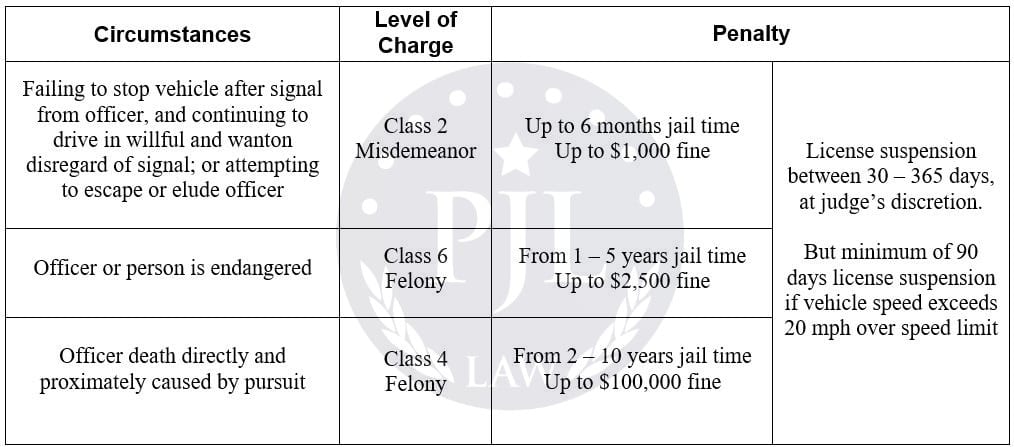Eluding Police in Virginia
Evading or eluding the police can be charged as a misdemeanor or a felony in Virginia depending on whether an officer was “endangered” in his pursuit. If you have been charged with eluding police or a law enforcement officer under Va. Code § 46.2-817, you need to know that this is considered a very serious criminal offense. This code section is also titled “disregarding signal by law-enforcement officer to stop.” The maximum penalty for eluding can range anywhere from 6 months to 10 years in jail, depending on the severity of the circumstances.
What does the prosecution have to prove to get a conviction for eluding? First, the prosecution must prove that you received a visible or audible signal from a police officer. Next, it must be proven that your vehicle was driven in a ‘willful and wanton disregard’ of such signal, or that you attempted to escape or elude the officer. These elements are not always easy to prove beyond a reasonable doubt, and your defense attorney will know what arguments to make to the court if the state does not properly prove its case against you. For a felony conviction, the court has to prove endangerment, which we discuss here.

Photo by Scott Rodgerson on Unsplash

At trial, the officer or prosecutor must prove each element of the case against you beyond a reasonable doubt. This is a very high standard, especially since there are so many elements in a standard eluding case. Even where it looks like the evidence is there to prove a case, sometimes a prosecutor is willing to offer a plea agreement. We’ve had prosecutors amend a felony eluding charge to a misdemeanor eluding charge or drop a charge in exchange for a guilty plea on another charge.
It is also important to know that the statute allows for an ‘affirmative defense’ to an eluding charge. An ‘affirmative defense’ means if you prove certain facts, the charge should be dismissed. In an eluding case, “if the defendant shows he reasonably believed he was being pursued by a person other than a law-enforcement officer”, the charge should be dismissed. Your defense attorney will know how to properly apply the affirmative defense to your case, should the facts warrant it.
Even if the Commonwealth can prove its case against you beyond a reasonable doubt, it is important to know that there are two phases to every trial: the guilt or innocence phase; and the punishment phase. In the guilt or innocence phase, the judge has to decide whether you did the crime. If the judge determines that you are guilty, the court moves to the punishment phase. What do you deserve as a punishment? You must be fully prepared for this phase, since many judges will expect you to present certain mitigating evidence. If you are not prepared for this stage, you may end up serving time in jail, or more time than you would if you were properly prepared. Your defense attorney will know how to ensure you are prepared for all phases of your eluding case.
Every eluding case is different, and the facts and circumstances of each are unique. It will be important to discuss your case with a defense attorney that practices in the jurisdiction where your eluding charge is pending. Since eluding is a complicated charge, it is a good idea to schedule a free initial consultation with a defense attorney to discuss all of your options.